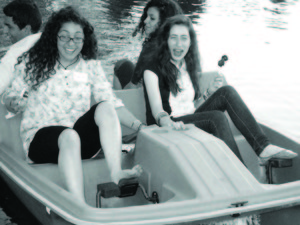
Last year, sophomore Yasmeen Abdelhamid decided to apply to participate in the Hands of Peace program. Around the same time, Palestinian Leen Anabtawi began a similar application process in an attempt to be a part of the same experience.
Months later, on July 4th, Anabtawi arrived in the United States. Hands of Peace coordinated Anabtawi’s stay with her host family, the Abdelhamids, for the following two weeks while both students participated in the program.
Julie Kanak, Hands of Peace director, says that the selection process considers religious, political and geographical diversity. They aim to include participants who are close to 15 or 16 years old.
“The purpose is to help create peace-building leaders of the future,” said Kanak. “We try to provide an opportunity for Israeli and Palestinians to meet each other and hear about the [Israeli-Palestinian] conflict from another point of view.”
According to Abdelhamid, most days the students are occupied with organized discussions about the conflict called dialogues. Hands of Peace also facilitates other activities such as team building, trips downtown and parties. Over those two weeks, the participants also spend their free time together.
“At first you get to know each other, play a lot of games and talk,” said Anabtawi. “By the second or third day, we are all such good friends, always hugging.”
Junior Ryan Harris also participated in Hands of Peace. After being informed of the program in a World Religion class, Harris decided the experience seemed “unique and informative.” He and his family hosted Israeli student Itamer Kakun.
Harris explains the program as “an eye opener.” He says the focus of the talks between the students is often what it’s like for the Israeli and Palestinians in day to day life. These were usually held at a local church or Oakton Community College.
Harris remembers experiences the group had outside of the dialogue, too. He said one special event was a “cultural cooking night” where everyone made their own dish. The Palestinians performed dances that they traditionally do at weddings.
“It’s really special when everyone can experience everyone else’s culture,” said Harris.
Anabtawi’s goal was mostly “changing some people’s minds.” She explains that the program wasn’t necessarily about a complete change in opinion, but rather an understanding. Her experience made her feel differently about individuals, but not the whole conflict.
“At first I thought it would just be fun … then I realized it was about getting to know [the Israelis] [and] getting to know who you are,” said Anabtawi. “Not all of them are bad or good, but there are some pretty good people who actually want to know us.”
Harris explained that most of the Palestinian and Israeli students had never been to America before Hands of Peace. Most hadn’t even spoken to someone of another nationality.
“There was one day where we actually wrote down like ‘what do you think the history is,’ you look at the Palestinians, and then you look at the Americans, and then you look at the Israelis and you’d think we were talking about three different places,” said Harris. “Everyone has their own idea of what the history is.”
Abdelhamid said that most of the participants are still in contact. They are all included in an email chain where they continue both the friendships and dialogues from the Hands of Peace program.
“They’ve lived in conflict their whole life,” said Abdelhamid. “When they go back home it’s still happening. Even though they came here and are more open to other things, when they go back home, they are still fighting for what they believe in.”
Harris explained the conflict and strong opinions as an aspect of what brought the participants closer. He said that both the Israelis and Palestinians began to understand each other as the program progressed.
“The friendships are beautiful,” said Harris. “I only knew them for two weeks, but I feel like I’ve known them for a long, long time.”

